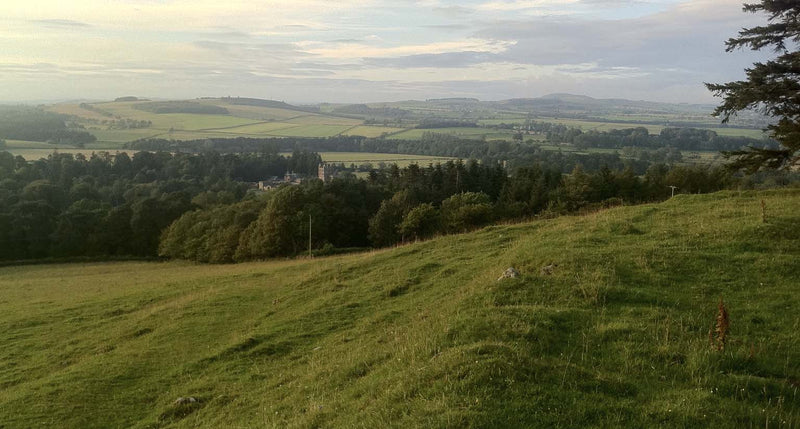Clan History, Clan Infomation
MacGill Clan History
The name MacGill is said to derive from ‘Mac a Ghoill’, meaning ‘son of the lowlander’ or ‘son of the stranger’. The name became established in Galloway prior to the thirteenth century. Maurice Macgeil witnessed a charter to the church of St Thomas the Martyr of Arbroath in 1231.
Sir James Makgill, who was a prominent Edinburgh merchant and a descendent of the old Galloway family, became Provost of Edinburgh during the reign of King James V of Scotland. He quickly embraced the reformed religion. He had two sons, of whom the elder, Sir James Makgill, purchased the estate of Nether Rankeillour in Fife. He studied law at Edinburgh and in June 1554 he became a member of the College of Justice, and later a Lord of Session. He took the judicial title, ‘Lord Rankeillor’. He was a friend and supporter of the reformer, John Knox.
Oxenfoord Castle. The estate was the original seat of the Viscount of Oxfuird, the hereditary Chief of Clan Makgill
Mary, Queen of Scots returned from France to reclaim her throne in 1561, and Rankeillor became one of her Privy Councillors. He was one of the nobles who were jealous of the influence exercised by the queen’s Italian secretary, David Rizzio. On 9 March 1566, a group of noblemen led by Lord Ruthven, burst into the apartments of the queen, dragged Rizzio from her side, and stabbed him to death. Makgill was heavily implicated in the murder, so when Mary took revenge for the outrage he was deprived of his judicial rank and forced to flee from Edinburgh. He was later pardoned, but ordered to remain north of the Tay. Later, he was restored to his offices. He was one of the commissioners who attended the regent on his journey to York to present accusations against the exiled Queen Mary, and was later sent by the Earl of Moray to London. He was ambassador to the court of Queen Elizabeth I of England in 1571 and 1572. During his absence his house in Edinburgh was attacked by supporters of the queen, and his wife was killed. He himself died in 1579. His younger brother, who had acquired the lands of Cranston-Riddell, was also appointed to the Court of Session in 1582. He had held the post of Lord Advocate, which he did not relinquish until 1589. He took the judicial title, ‘Lord Cranston-Riddell’. He was succeeded in March 1594 by his son, David, who followed him onto the Bench.
David Makgill was succeeded by yet another David, the third Laird of Cranston-Riddell, who died without male issue in May 1619. His brother, Sir James Makgill, was created a Baronet of Nova Scotia in 1627 and appointed a Lord of Session in 1629. By letters patent dated 19 April 1651, he was elevated to the peerage with the titles of ‘Viscount Oxfuird’ and ‘Lord Makgill of Cousland’. He died in May 1663.
He was succeeded by his son, Robert, the second Viscount who had a son and heir, Thomas, by his second wife, Lady Henrietta, only daughter of the Earl of Linlithgow. Thomas died in 1701, five years before his father, leaving no issue. The viscountcy was claimed by the son of the second Viscount’s eldest daughter, Christian, but this was challenged in 1734 by James Makgill of Nether-Rankeillor, sixth in descent from Lord Rankeillor. The House of Lords refused to uphold his claim, but equally denied that of Christian’s son, William Maitland, and the title became dormant. Christian’s younger sister, Henrietta, later assumed the title of Viscountess of Oxfuird, without establishing her legal right thereto, but in any event she died in 1758 without issue.
The estates of Nether-Rankeillor passed through an heiress to the The Honourable Frederick Maitland, sixth son of the Earl of Lauderdale. The family thereafter assumed the name Maitland Makgill, and when David Maitland Makgill of Rankeillor became heir of line to the Crichton viscountcy of Frendraught, they then styled themselves Maitland Makgill Crichton. It was a member of this family who established his right to the chiefship of the Crichtons and, abandoning his additional surnames as required by Lyon Court decree, was recognised in 1980 as Crichton of that Ilk. In 1986 Crichton’s kinsman, George Hubbard Makgill, was recognised as the thirteenth Viscount of Oxfuird and chief of the Makgills.

